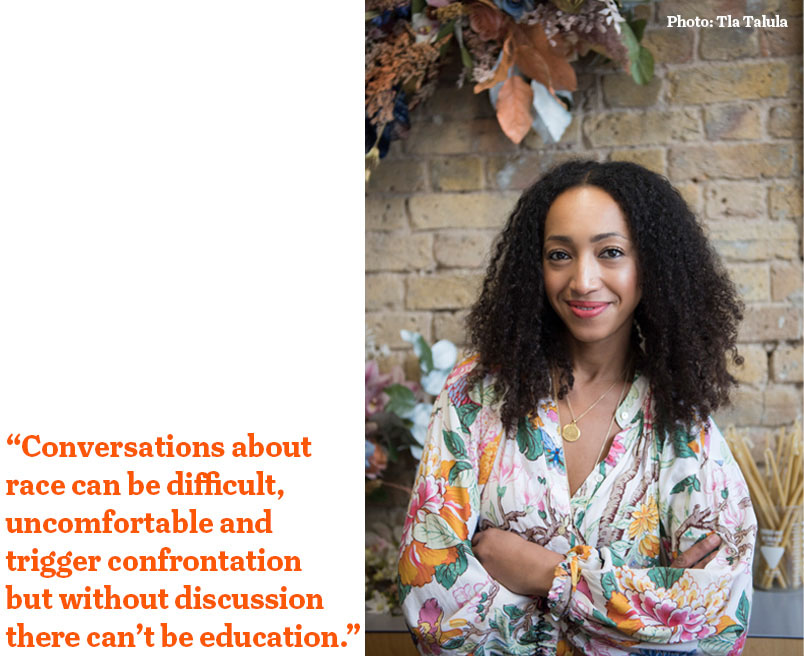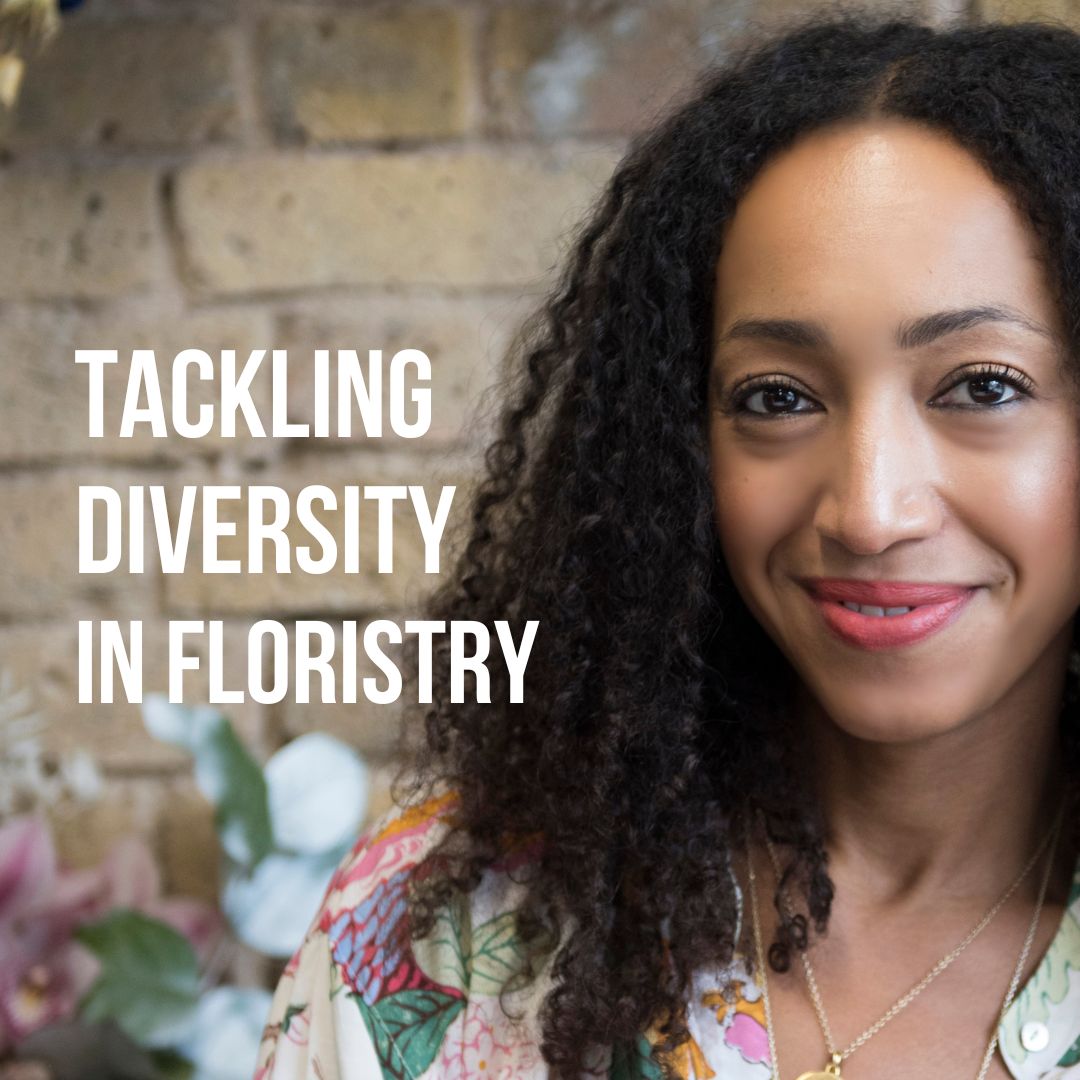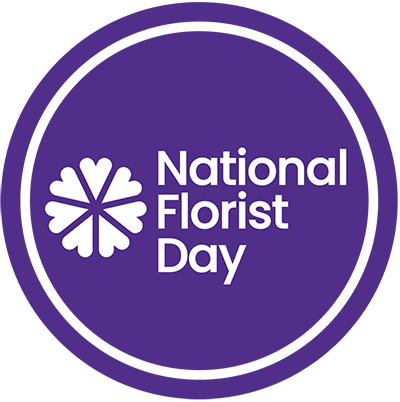For anyone disadvantaged due to race, ethnicity and socioeconomic status, there are invisible barriers to becoming a successful florist.
In this Q&A we speak to Hazel Gardiner, a dual-heritage floral designer who has been able to embrace her individuality and carve a successful career. She talks us through her experience while explaining the difficulties faced by many others.
Can you give examples of occasions you’ve felt a lack of diversity in the flower industry?
It became evident quite quickly that I could not see myself represented in various areas of the industry. This has been the case since school due to where I was brought up through to my previous careers in television production and the fashion industry. I understand the historical and socio-economic reasons but I’m often in the minority at plant fairs, nurseries and flower shows. Many times, it has made me reflect, ‘why do I feel like I don't belong and why is that uncomfortable’? I know the industry has many highly skilled and talented individuals from both the BIPOC and LGBTQIA communities, but we don’t see ourselves enough.
What are some of the barriers faced by people of colour?
Try to imagine living in an area, attending or school or being in a workplace and not seeing yourself represented either in appearance or background within your peer group or within those of a position of authority. Then have a think about how that would make you feel, what it would do to your confidence and feeling of belonging? With any career path, especially if you’re young, it may result in you questioning your validity in existing in that space. It takes confidence and strength to enter an arena where you’re knowingly going to be a minority and what that may mean for your career progression or the wrongful judgments you may be on the receiving end of.
If you attend a course or visit a wholesale markets and don’t see yourself, you are going to ask yourself, will people react to me differently because of the colour of my skin? This creates the need for strong mental armour and increased self-worth. But what if you don’t have the guidance and support to create this? Parents of BIPOC children often say to their children: ‘you’ve got to work much harder than everyone to get ahead’. In turn the world needs to acknowledge that certain communities have this narrative.
I was brought up in a white, suburban London neighbourhood with the privilege this brings, and I’ve learnt to embrace my individuality, but it can terrify a lot of people who might give up because it’s too much pressure. The need to always ‘do better’ has an impact on your character, it changes your everyday actions and the way you see yourself. And it is such a shame because everyone needs nurturing - we can’t all be perfect from the start. We all need to be encouraged and supported especially at the beginning of our careers.
What brought you into flowers?
I turned to flowers professionally after a cancer diagnosis completely altered the way I interact with nature. I had extensive treatment with punishing side-effects. Reading and even watching television became problematic. I found solace in creating a garden in my flat which I had just moved into it. I found it meditative and it gave me purpose, routine and a sense of much needed achievement with being unable to work. Flowers are much more than just beautiful – they give back to your physical and mental wellbeing. After remission I started a vintage clothing business which I ran for many years. I re-trained in floristry in 2016, ignited by my increased passion for the natural world and the pull to work with my hands. I was lucky that I’d already had a lucrative career, so I had the funds and brain space to decide to make the switch, but this isn’t something a lot of people can even consider.
What stops people from even considering flowers and horticulture?
For many people, perceiving flowers as something that’s “not for me” starts at a foundational level. At school, horticulture isn’t a set subject so unless children discover gardening at home they may not realise they have an interest in it. Location, children living in built-up urban areas are much less likely to experience nature in all its glory.
Some communities aren’t able to harness the mental and emotional benefits of nature because they don’t have time to appreciate it or feel unwelcome in public green spaces. Many may not realise how important good mental health is for overall wellbeing, and sometimes it’s not part of their culture to value it. So if you’ve grown up seeing flowers and plants as a luxury, you’re unlikely to consider them for your own home let alone a career path.
We know that ethnicity and economic backgrounds are intertwined, for instance, government stats show that that people from ethnic minority groups are more likely to live in the most employment-deprived and income-deprived neighbourhoods, whereas White British or Irish people are the least likely to live in them.

Are financial barriers an impact in floristry?
Definitely, especially if you’re changing career as an adult, but even for young people it’s difficult because turning 16 might mean becoming a breadwinner so your family can’t fund you to go to college. Work experience is usually unpaid, so you’ve got to be able to afford to take time out of your day job and family commitments to do it.
Generally, if you’ve not got a lot of money, paying for a private course is out of the question as they can cost thousands. Courses at traditional colleges such as City & Guilds and NVQs are a more affordable option and do offer flexible learning, which is positive and something that private schools could learn from. However, they are often less appealing to those looking to learn a particular aesthetic.
I’ve heard people say, “I took a college course, but it wasn’t my style.” This is part of the problem, as the private courses allow people to prosper through learning all kinds of different styles and the latest skills such as sustainable design, current trends and career advice like modern marketing. Colleagues teach the much-needed and respected rudiments of floristry but it feels like a meeting of the minds is needed between the two.
What would you say to people who don’t get involved in the conversation around race because they feel nervous about saying the wrong thing?
I appreciate that these conversations can be difficult, uncomfortable and trigger confrontation but without discussions there can’t be education. Open communication about these topics increases knowledge and we can’t blast ignorance without this. So, feel and acknowledge your discomfort and push past it. If your intentions are informed, you’re equipped to deal with any negative comments. It’s paramount that business owners act; to stay silent is to be complicit.
This doesn’t mean your goals and actions has to be publicly announced on Instagram or Facebook – but silence must be tackled within your organisation. Ask yourself: why do I feel scared or uncomfortable saying this? Am I doing enough to counteract the imbalance?

What steps can we take to make changes?
For diversity to become a part of your business ethos it takes long-term education and informed strategy, not short-term token statements. This includes a commitment to unconscious bias when hiring throughout every level of the business, including top tier management positions.
Here’s a full list of suggestions for every florist
-
Start the conversation, more often. Bring up the topic with your fellow florists, suppliers, and others in the industry. Don’t let it get swept under the carpet.
-
Champion diverse public figures: follow and share social media posts from people of colour and people of different backgrounds.
-
Think about inclusivity in your marketing. As image-makers, consider all of the imagery on your websites, social feeds and brochures, especially when planning your own shoots, in terms of race but also elements such as showing same-sex marriages.
-
Go public with your support: this doesn’t have to mean a scary official “public statement”. It could mean an Instagram post sharing a link to an anti-racism blog, or a post featuring flowers alongside an uplifting quote about the importance of equality and support for everyone regardless of race, class or identity.
-
You could also show your support publicly by pledging to donate to charities that fight for equality and against racism, as one florist in Newcastle did this summer.
-
If you’re part of a bigger team or group, hold meetings to plan ways to improve inclusivity and consider appointing somebody responsible for keeping on top of it.
-
Celebrate other cultures with your own floral education, for instance, learn how to make tributes and traditional wedding designs for different religions and cultures. It would prove beneficial to you, helping you gain more multicultural clients.
-
When running workshops, consider offering one or two free places to people of lower socioeconomic backgrounds.
-
Even if you don’t normally need extra staff, during quiet periods think about contacting a local school to offer work experience to youngsters from lower socioeconomic backgrounds.
-
If you’re based near a built-up town or city, think about initiatives you could undertake to bring flowers to your community – especially those who live in more deprived areas. It could be a community outreach project with schools or local housing estates and would be a positive marketing message for your business as well.
For business owners in the position of hiring staff or offering work experience:
-
Commit to unconscious bias when hiring throughout every level of your business, including in top tier managerial positions.
-
Be proactive with your hiring and selecting of work experience trainees, always find ways to get the message out to less advantaged communities.
-
If someone less privileged – with drive but without qualifications – comes to you for work, look into options to train them alongside the job such as workplace training schemes and part-time college courses funded by bursaries or loans.
-
If you have employees from disadvantaged backgrounds, think about ways to protect and support them – especially during difficult periods like the events of this summer for the BIPOC community. Whether it’s a message to ask whether they’re ok, to tell them you’re always open to talk, or simply a positive note in appreciation of their work.









